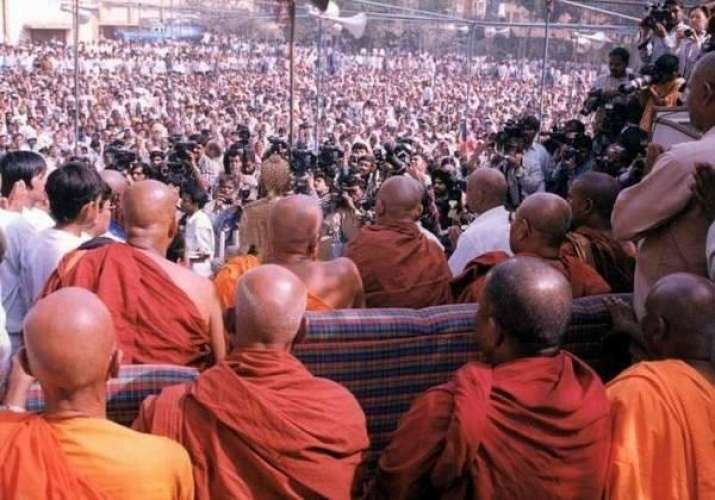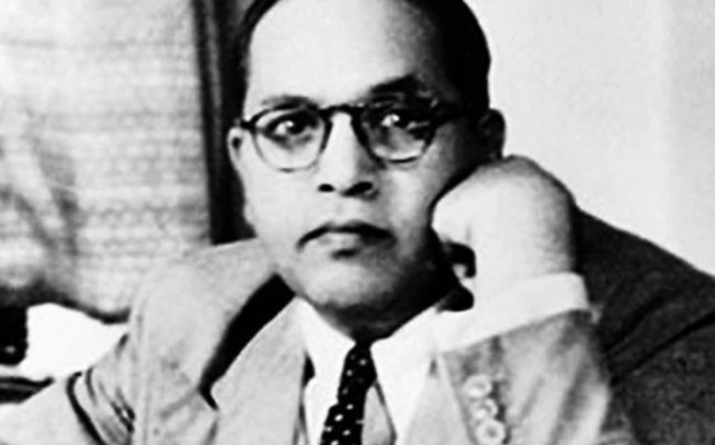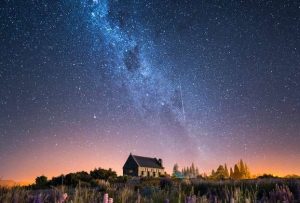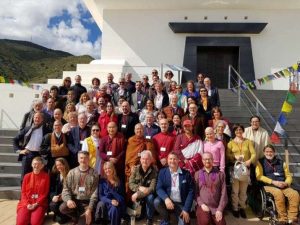
During the annual festival of Dussehra (also known as Vijaya Dasami) in India, this year held on 19 October, more than 10,000 people from the Dalit community of Pukhrayan village in Uttar Pradesh’s Kanpur Dehat district, India, allegedly embraced Buddhism, The Times of India reports.
According to report, 12 Buddhist monks conducted the conversion ceremony, following a festival for the demon king Ravana, in the presence of Bahraich Bharatiya Janata Party (BJP) member of parliament Savitri Bai Phule. The district administration, on the other hand, refutes the claim that any conversions took place. Kanpur Dehat DM Rakesh Singh described the celebration as “a rally in honour of Ravana, which is an annual affair.” (The Times of India)
Dussehra is a major Hindu festival that marks the victory of Vishnu’s avatar Rama over Ravana and the victory of the warrior goddess Durga over the bull demon Mahishasura. It is also the day that the social reformer and the principal architect of the Constitution of India Dr. B. R. “Babasaheb” Ambedkar took refuge in the Triple Gem alongside other Dalits in Nagpur, Maharashtra, in 1956, inspiring the Dalit or Ambedkarite Buddhist movement. The Dalit community has embraced Buddhism each Dussehra ever since.
“The ceremony was conducted in the spirit of Ravana, Lord Gautama Buddha, Samrat Ashoka, and Babasaheb Ambedkar, who fought against caste discrimination in society,” said Dhani Rao Baudh Panther, the organiser of the event and president of Bharatiya Dalit Panther Committee. (The Times of India)
Dhani Rao noted that Ravana was a Buddhist scholar and asked villagers not to burn his effigy, as is customary, since it would insult him. Speaking of the conversion ceremony, he said: “We have been organising a Baudh Deeksha [Buddhist refuge] ceremony every year so that the future generations would remember the sacrifices of Ravana, Lord Gautam Buddha, Samrat Ashoka, and Babasaheb Ambedkar. We will continue the tradition of converting poor Dalits and other backwards to Buddhism.” (The Times of India)
“I went there to attend the ceremony as Buddhism has shown the possibility of dignity and equality,” said Bahraich BJP MP Savitri Bai Phule, when asked about her presence at the ceremony. “We will make entire India Buddhamayi [realm of the Buddha] and Samrat Ashokamayi (realm of the emperor Ashoka), and bring an end to the Manuwadi system (the caste system, which is based on the ancient text Manusmriti] prevailing in the country. We will wipe out those who have fed this country with the poison of caste divide.” (The Times of India)

Dalit conversions often have a political and social objective, and converting to Buddhism is, at times, used as leverage. During the conversion ceremony held last month at Guru Ravidass temple in the village of Bhatla in Haryana State, for example, about 200 Dalit families chose to convert to Buddhism in the hope of ending spiritual and social discrimination, having allegedly faced social boycotts by the upper classes, the police, and the government.
And according to Rajat Kalsan, convener of the National Alliance for Dalit Human Rights, present at the ceremony in Bhatla, Dalit families from the village of Rohnat in Haryana had notified the state governement that they are considering conversion due to the social injustice they face.
“After a revolt in Rohnat in 1857, the British had auctioned the village to outsiders,” said Rajat Kalsan. “Around 150 Dalit families have been fighting with the state government for the last 50 years to get back their land, which was auctioned to outsiders by the British, without any luck. They said if their demand was not accepted then they would also adopt Buddhism.” (The Times of India)
See more
Over 10,000 Dalits ‘adopt’ Buddhism in Kanpur Dehat (The Times of India)
After Jind, 200 Dalit families in Hisar village embrace Buddhism (The Times of India)














